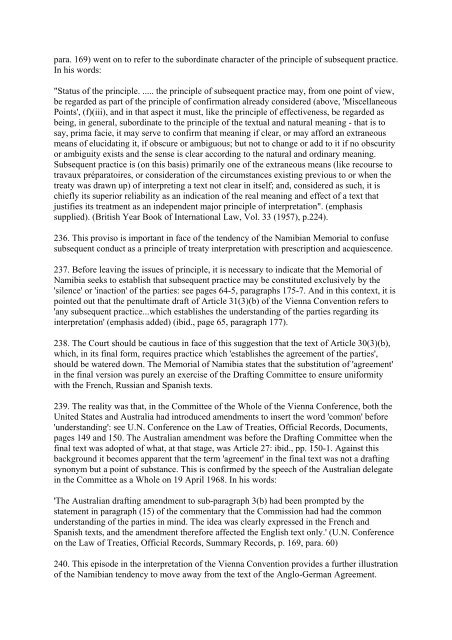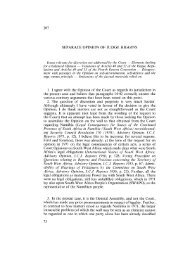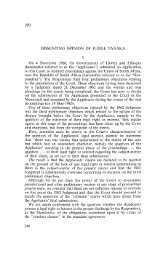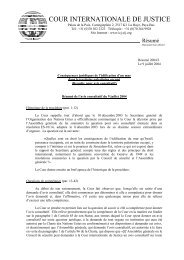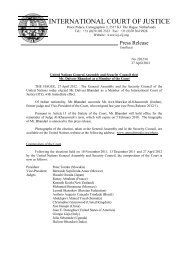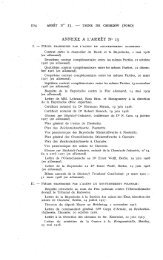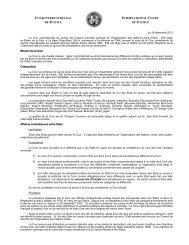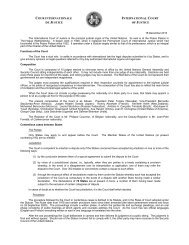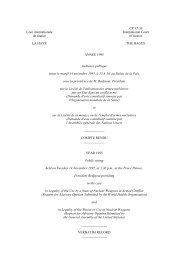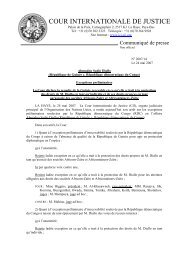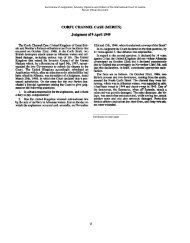botswana/namibia - Cour international de Justice
botswana/namibia - Cour international de Justice
botswana/namibia - Cour international de Justice
Create successful ePaper yourself
Turn your PDF publications into a flip-book with our unique Google optimized e-Paper software.
para. 169) went on to refer to the subordinate character of the principle of subsequent practice.<br />
In his words:<br />
"Status of the principle. ..... the principle of subsequent practice may, from one point of view,<br />
be regar<strong>de</strong>d as part of the principle of confirmation already consi<strong>de</strong>red (above, 'Miscellaneous<br />
Points', (f)(iii), and in that aspect it must, like the principle of effectiveness, be regar<strong>de</strong>d as<br />
being, in general, subordinate to the principle of the textual and natural meaning - that is to<br />
say, prima facie, it may serve to confirm that meaning if clear, or may afford an extraneous<br />
means of elucidating it, if obscure or ambiguous; but not to change or add to it if no obscurity<br />
or ambiguity exists and the sense is clear according to the natural and ordinary meaning.<br />
Subsequent practice is (on this basis) primarily one of the extraneous means (like recourse to<br />
travaux préparatoires, or consi<strong>de</strong>ration of the circumstances existing previous to or when the<br />
treaty was drawn up) of interpreting a text not clear in itself; and, consi<strong>de</strong>red as such, it is<br />
chiefly its superior reliability as an indication of the real meaning and effect of a text that<br />
justifies its treatment as an in<strong>de</strong>pen<strong>de</strong>nt major principle of interpretation". (emphasis<br />
supplied). (British Year Book of International Law, Vol. 33 (1957), p.224).<br />
236. This proviso is important in face of the ten<strong>de</strong>ncy of the Namibian Memorial to confuse<br />
subsequent conduct as a principle of treaty interpretation with prescription and acquiescence.<br />
237. Before leaving the issues of principle, it is necessary to indicate that the Memorial of<br />
Namibia seeks to establish that subsequent practice may be constituted exclusively by the<br />
'silence' or 'inaction' of the parties: see pages 64-5, paragraphs 175-7. And in this context, it is<br />
pointed out that the penultimate draft of Article 31(3)(b) of the Vienna Convention refers to<br />
'any subsequent practice...which establishes the un<strong>de</strong>rstanding of the parties regarding its<br />
interpretation' (emphasis ad<strong>de</strong>d) (ibid., page 65, paragraph 177).<br />
238. The <strong>Cour</strong>t should be cautious in face of this suggestion that the text of Article 30(3)(b),<br />
which, in its final form, requires practice which 'establishes the agreement of the parties',<br />
should be watered down. The Memorial of Namibia states that the substitution of 'agreement'<br />
in the final version was purely an exercise of the Drafting Committee to ensure uniformity<br />
with the French, Russian and Spanish texts.<br />
239. The reality was that, in the Committee of the Whole of the Vienna Conference, both the<br />
United States and Australia had introduced amendments to insert the word 'common' before<br />
'un<strong>de</strong>rstanding': see U.N. Conference on the Law of Treaties, Official Records, Documents,<br />
pages 149 and 150. The Australian amendment was before the Drafting Committee when the<br />
final text was adopted of what, at that stage, was Article 27: ibid., pp. 150-1. Against this<br />
background it becomes apparent that the term 'agreement' in the final text was not a drafting<br />
synonym but a point of substance. This is confirmed by the speech of the Australian <strong>de</strong>legate<br />
in the Committee as a Whole on 19 April 1968. In his words:<br />
'The Australian drafting amendment to sub-paragraph 3(b) had been prompted by the<br />
statement in paragraph (15) of the commentary that the Commission had had the common<br />
un<strong>de</strong>rstanding of the parties in mind. The i<strong>de</strong>a was clearly expressed in the French and<br />
Spanish texts, and the amendment therefore affected the English text only.' (U.N. Conference<br />
on the Law of Treaties, Official Records, Summary Records, p. 169, para. 60)<br />
240. This episo<strong>de</strong> in the interpretation of the Vienna Convention provi<strong>de</strong>s a further illustration<br />
of the Namibian ten<strong>de</strong>ncy to move away from the text of the Anglo-German Agreement.


